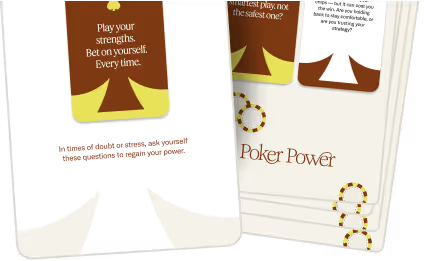Merriam-Webster defines imposter syndrome as a "persistent doubt concerning one's abilities or accomplishments accompanied by the fear of being exposed as a fraud despite evidence of one's ongoing success."
Many women suffer from varying degrees of imposter syndrome ranging from feeling like they can't deliver on a project before it even starts to fearing they will lose their jobs because someone will find out they're not qualified for the position in the first place. These anxieties can greatly inhibit career and personal growth.
By building life skills through the game of poker, you can internalize and increase your inherent value. Poker allows you to compete in a meritocracy to see how your skills stack up with no grey area for self-doubt. Here are some techniques borrowed from poker on how to combat imposter syndrome while building confidence.
Getting in tune with your biases
Poker players are in a perpetual state of reflection. Part of playing your best poker game requires identifying which of your tendencies are leading you to play suboptimally. Perhaps you’re naturally curious about your opponent’s hands, calling their bets too often to see their cards. Or, maybe your risk aversion prohibits you from making the bold bluffs necessary to play at a high level.
Everyone has biases, but not everyone is forced to confront them to improve their performance, which is key when working on how to overcome imposter syndrome. By tackling the limitations in your poker game, you’ll learn a lot about yourself and gain confidence through mastery, ultimately understanding how to combat imposter syndrome.
The next time you doubt your legitimacy as the only woman in the boardroom, understand that your insecurities aren’t grounded in any personal shortcomings because you've already dug deep to optimize your skills. This reflection can give you closure on lingering worries of inadequacy and help you get over imposter syndrome.
Seeing the varied backgrounds of success
The poker table is a melting pot of society. At your local card room, you might see an electrician next to a lawyer, next to a software engineer, next to a dental hygienist. Many poker players have master’s degrees while some never went to college. Yet the success of each player is largely not correlated with where they come from.
Success in poker comes from a developed set of soft skills, including intuition and analytical aptitude, which can be learned from each person's unique career experiences. You’ll meet role models at the poker table who challenge you in ways you might not be used to, but, ultimately, they will help you grow, while also helping you overcome imposter syndrome.
It’s reassuring to see that there is no appearance, socioeconomic status, or a particular set of standards necessary to be successful. In fact, many high-stakes poker pros sit down at the table in sandals and sweatpants. The only factors that influence your achievement in poker are your skills, decisions, and the work you put in to improve your game.
Creating your own luck
One of the most common feelings tied to imposter syndrome is that you only got to where you are today through luck. Poker teaches you how to combat imposter syndrome while making your own luck. It can be easy to brush off the result of a single hand of poker as lucky or unlucky but over time the player who makes the best decisions wins. By building up a thick skin to the variances of poker, you’ll be able to better navigate good and bad luck throughout life.
If you don’t feel like you fit in at your new job in finance because you had a worse trading day than your co-workers, trust your process. Continue to execute on the strategy that led you here and know that the law of averages will revert towards a just and validating result over a period of time. Luck is going to be present in any venture, but what separates you from the competition is how you respond to the outcome.
If you’re still wondering how to combat imposter syndrome and can’t shake the feeling that you were merely lucky to land your job, build on your opportunity rather than feeling guilty to have received it. Feel emboldened to be in your position and demonstrate your effort and gratitude to mentors who can help you thrive in the role.
Racking up the wins
One of the best ways to overcome imposter syndrome while being more self-assured at work is to score big wins outside the office to remind yourself that you are capable of greatness. Poker is the perfect platform to improve your abilities, duel wits, and rack up some wins you’re really proud of.
If you win a poker tournament on Friday night, Monday’s pitch meeting won’t feel as daunting. After pulling off a game-changing bluff, you’ll feel like you have a new tool kit at your next salary negotiation. And when a player you used to idolize has finally conceded that you’ve surpassed her skills, picturing yourself in your manager’s position feels more like a premonition than a pipe dream.
Want to learn more about how poker can help you combat imposter syndrome, enhance your skillset, and help you become the most confident version of yourself? Enroll in community poker lessons. You’ll learn the rules and best strategic practices of poker in an inviting space taught by women for women. Are you ready to take your seat at the table and truly feel like you belong?





